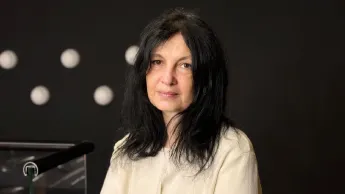Our new series gives international Germany alumni the opportunity to report on the impact of their funding and stay in Germany on their personal development and professional career. Ruxandra Cosma from Romania sets the tone. Her research stays in Passau and Mannheim enabled this linguist to delve deep into the German language.
These funding programmes gave me the opportunity to immerse myself in the German research environment. That’s as important to my profession as the air we breathe.
Ruxandra Cosma from Romania didn’t need too long to consider when asked what she likes about Germany. ‘I thinks it’s fantastic to see so much cheerfulness on the streets. People approaching me on the pavement smile at me in a friendly manner’, says Cosma. A phenomenon that repeatedly brings her joy. And she is also impressed with German interior design. ‘We in Romania tend to be more functional in our furnishing, whereas in Germany a lot of importance is attached to cosiness’, says Cosma who teaches German Linguistics at the University of Bucharest and has completed a few research stays in Germany in the course of her career.
She discovered her love of the at an early age. She lived in Austria for a few years as a child. On her return to Bucharest, she attended a school in which the subjects were taught in German. ‘I passed my German Studies exams with a “very good” grade and was advised to get into research’, Cosma relates. She was awarded her doctorate in 1999 and this year she should receive her qualification as a lecturer teaching at professional level.
Intensifying language skills, conducting research as an equal
Her research stays in Germany proved to be extremely advantageous in her academic career. ‘Given that I teach , they gave me a wonderful opportunity to take a deep dive into the German language’, says Cosma. She undertook her first stay in Germany at the University of Passau three years before being awarded her PhD. ‘I joined the team around renown syntactician Professor Eroms and enjoyed frequent contact with other lecturers. This meant I could fully exploit my time at the university’, Cosma affirms.
Research stays in Mannheim subsequently followed. The scientific supervisor of her doctoral thesis put her in touch with the in Germany. She was also a Humboldtian. This gave Cosma access to a research grant, whereby the enabled her to conduct research in Mannheim. A Humboldt research stay at the Leibniz Institute for the German Language (IDS, Leibniz-Institut für Deutsche Sprache) and a at the IDS then followed. ‘I was fully assimilated into the Department of Grammar and was able to conduct joint research as an equal. Such trust gives you wings’, says the prospective professor.
Good reasons to do research in Germany
Her time acting in an honorary capacity as an Ambassador Scientist for the Alexander von Humboldt-Stiftung in Romania also contributed to the expansion of her horizon. ‘These two terms of office enabled me to gain deep insights into the Romanian research environment. Acting in an honorary capacity enriched my life to a massive extent’, Cosma commented.
The role of Ambassador Scientists acting in an honorary capacity on behalf of the Alexander von Humboldt-Stiftung is to inform higher education institutions and research institutions at home and abroad about Germany as a research location, and in particular about the funding programmes and the foundation’s international network.
Valuable insights into academic life in Germany
Her stays in Germany gave this German Studies doctoral candidate a great insight into its academic world. What she really appreciates is the ease of access to research in Germany. Firstly, she feels that the libraries are markedly better equipped than those in Romania. And secondly, that it’s easy to find the right individuals for the various research topics. ‘The working conditions in general are excellent’ Cosma believes.
Despite the fact that this native Romanian speaks outstanding German, there are still occasional hurdles that she has to overcome. ‘Being in Germany isn’t as easy as you might imagine’, states the linguist. It’s assumed that you also know a lot about how life there functions. Cosma regularly exchanges views about this with her cooperation partners.
Just recently she experienced that it can even be a hindrance . When Cosma suffered a joint injury during her stay in Germany, she called the number for the ambulance service, 112, and described her emergency. The paramedic on the phone asked her somewhat gruffly why she wouldn’t simply drive to an orthopaedic surgery or a hospital. She then explained to the slightly baffled man: ‘I may speak very good German, but I’m nevertheless not familiar with how things work here.’

